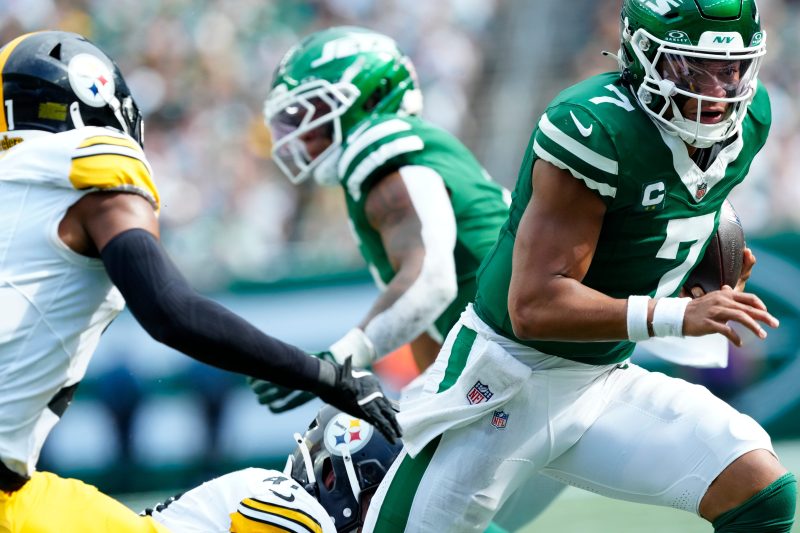
- The New York Jets lost their season opener 34-32 to the Pittsburgh Steelers in head coach Aaron Glenn’s debut.
- Despite the loss, the Jets’ offense showed significant improvement, with quarterback Justin Fields accounting for three total touchdowns.
- New York’s offense did not punt in the first half for the first time since 1991 and averaged 6.4 yards per play.
EAST RUTHERFORD, N.J. – Postseason berths aren’t earned in Week 1, and the New York Jets have waited 14 years for one.
Maybe the missed-playoff streak will continue for another one. But the Jets, in 2025, might at least have some semblance of an identity. In the first year of head coach Aaron Glenn’s tenure, that would be a successful campaign alone after a decade and a half of wandering the wilderness.
Indeed, there were elements of Sunday’s 34-32 loss to the Pittsburgh Steelers – the return of Aaron Rodgers – that indicated “same old Jets.” Special teams blunders. Points left on the table via missed extra points and two-point conversions in a close game. A star player (wide receiver Garrett Wilson, who had seven catches for 95 yards and a touchdown) being blown up by the opposition’s star (Steelers cornerback Jalen Ramsey) on the final play from scrimmage.
Aaron Rodgers says ‘no hard feelings’ about Jets exit. His words indicate otherwise
“Because of the way that we play, and the way that we want to operate, there’s a chance that we’re going to be in a lot of those games,” Glenn said. “Plus, we know this league comes down to that anyway. To be able to make plays in games like this here is going to be critical for us.
“But I would say this, there’s going to be no confidence lost from these guys. These guys have been busting their butts for a long time. Again, there’s no such thing as moral victories in my eyes, but there are some things that we can definitely build on both sides of the ball. Even though there are some things we have to fix on defense, but there are some things we can build on.”
The biggest difference was the offense, obviously. Offensive coordinator Tanner Engstrand clearly has a plan for Fields’ usage and will highlight his running prowess. Fields carried 12 times for 48 yards and two touchdowns. Engstrand’s call on 4th-and-goal from the one with seven minutes left in the game – a Fields bootleg to the right for a walk-in touchdown that the quarterback amplified with some zesty steps – was one example of the creativity and emphasis on the overall run game the Jets will deploy all season.
“(The Steelers) acquired all these guys in the offseason, future Hall of Famers on that side of the ball (defense),” Fields said. “We put up 32 and there were still plays left out there. So, like I said, all we got to do is keep building, keep getting better, and we’ll be good.”
New York had 23 first downs, which was the second-most they had all of last season with Rodgers as quarterback (their best mark was 27 in 2024). The 6.4 yards per play the unit averaged would have been third last year.
Fields finished 16-for-22 with 218 passing yards and a score through the air. Running back Breece Hall averaged 5.6 yards per carry against (19 carries, 107 rushing yards).
The Jets scored on four straight possessions to start the game and didn’t punt in the first half since 1991. Chad Pennington, Brett Favre, Vinny Testaverde, Mark Sanchez and many more passed through before the combination of Fields and Engstrand (and others) helped the Jets pull it off again.
“I thought he did an outstanding job, outstanding,” Glenn said of his quarterback’s play.
Fields looked an awful lot better than his Steelers’ quarterback competition last season, Russell Wilson, who is now with the Giants. A couple-hundred miles down I-95 in Maryland, Wilson was 17-for-37 with 168 yards for his new team that failed to score a touchdown in a 21-6 loss to the Washington Commanders.
Glenn, the former Detroit Lions’ defensive coordinator, has plenty to address on that side of the ball. His top players know that too.
“We have to do the right things right and delete the wrong things out of our DNA, out of our standards, and out of our culture,” defensive lineman Quinnen Williams said. “That’s the things that we have to kind of go to the drawing board and delete – all the negative things, all the small details that we didn’t execute on. We have to get that completely deleted.
“We did some good things today but ultimately to be the team that we want to be and the team that we’re capable of being we have to delete those small things that ultimately help (you lose) football games.”
